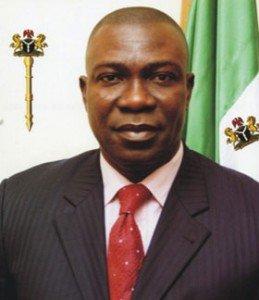


Ekweremadu, Obiozor, others brainstorm on nation’s Constitution

MOST commentators, especially politicians, would easily choose a political gathering or similar forum to make profound commentary on some controversial national conversations and issues. This is because they are sure to get accolades from an audience that would largely be constituted of friends and supporters.
But there are few of them who would venture to use the ivory tower as a platform to engage in such postulations for fear of their thoughts being subjected to thorough intellectual scrutiny by eggheads who usually constitute the bulk of the audience in such environment.
Deputy President of the Senate, Senator Ike Ekweremadu, however, braced the odds, last Monday, when he delivered a lecture that many intellectuals said would serve as a guide to Nigeria’s struggle for an acceptable peoples’ Constitution and by extension national cohesion.
The event was the 2015 Annual Lecture of the Faculty of Law, Nnamdi Azikiwe University, Awka, Anambra State, with the theme: “The Politics of Constitutional Review in Multi-Ethnic Societies.” The programme attracted a diverse audience including eminent professors of law, foremost legal practitioners, among them, senior advocates of Nigeria (SANs), law teachers, renown political scientists, communication scholars, lawmakers, members of the diplomatic corps and students.
The Governors of Enugu State, Ifeanyi Ugwuanyi and Deputy Governor of Anambra State, Dr. Nkem Okeke, former Nigeria’s Ambassador to Israel and United States of America, Prof. George Obiozor, Prof. Okechukwu Ibeanu of the Department of Political Science, University of Nigeria, Nsukka, Prof. Maxwell Gidado of the Faculty of Law, Nasarawa State University, were among several others from across the country who also attended the public lecture.
Roadblocks to acceptable Constitution
In his presentation, Senator Ekweremadu, a fourth term Senator and third time Deputy Senate President, who also doubles as Speaker of the ECOWAS Parliament, identified ethno-sectional interests as major stumbling blocks to Nigeria’s quest for a more acceptable Constitution.
Ekweremadu regretted that vital amendments which would have helped to deepen Nigeria’s democratic experience, enhance equity and justice and boost national development, had perished at the altar of mutual suspicion and narrow ethno-sectional interests.
“Mutual ethno-sectional and religious suspicions have become so ingrained in our body polity to the extent that even the most patriotic and altruistic intentions are almost always interpreted from myopic prism of such sentiments and interests. It is noteworthy that no group or part of the country, whether north or south, can lay claim to innocence in the ethno-sectional intrigues that becloud Constitution review efforts in Nigeria. We all have our portions of the blame,” he said.
Ekweremadu also reiterated his call for fiscal federalism and the restructuring of the country into six regions, along the six geopolitical zones as the current 36 state-structure was unsustainable due to high cost of governance resulting from unnecessary duplication of political offices and bureaucracy.
Nigeria’s unity negotiable
Obiozor, in his opening remarks, entitled: “Imperatives of a New National Constitution,” asserted that from independence in 1960 till date, no generation of Nigerian leadershas been able to create an atmosphere of credibility to ensure Nigeria’s claim to a political future as one nation.
“None has been able to evolve a unifying national ideology that was embraced either by fellow political elites or by the entire Nigerian populace,” he said. Obiozor declared that no people or group denied justice anywhere in the world would be interested in peace and described the assertion by some politicians that Nigeria’s unity is not negotiable as ironical, noting that these leaders had forgotten or failed to learn the lessons of history.
“Nigeria’s unity is definitely negotiable and must be re-negotiated for it to stand or survive the test of time. The reality over the years remains that in spite of the best efforts of all our leaders past or present, Nigerian unity is not guaranteed. It is simply, at best, an aspiration and not yet an achievement; hence the statement that Nigerian unity is ‘not negotiable’ is simply a historical fallacy,” he said.
The former Ambassador insisted that the disparity between claims to nationhood and the political realities in Nigeria are responsible for the political instability, military coups, sporadic guerrilla warfare, crises and violence that have characterized Nigeria’s history. “Certainly, history has been kind to Nigeria but nobody knows for how long. The 2014 National Conference report is a pathway for Nigeria to return to political stability, and genuine unity and integration,” he advised.
The people’s Constitution
On his part, Ibeanu said described Nigeria’s Constitution as a biography of the elite of the country explaining that in the the final analysis, everything dissolves into the interest of the elite – those who feel excluded and those who are included. He said that there was need to create a political order which he said was a system of relationship between the elite and the common people.
He warned that, “the continuous exclusion of the common man will be the Waterloo of this nation,” adding that constitutional amendments only address the interest of the elite.
Source: Vanguard
Share this post
Naijanetwork Forum Statistics
Threads: 15172,
Posts: 18267,
Members: 6810


